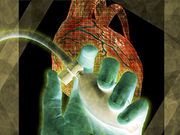Younger women less likely than men to be warned of risk, get same treatments or survive after MI
TUESDAY, Oct. 27, 2015 (HealthDay News) — New research suggests that doctors don’t warn younger women when they’re at risk for cardiovascular disease as often as they warn men. And once younger women suffer an ST-segment elevation myocardial infarction (STEMI), they are less likely to receive revascularization and more likely to die in the hospital. The findings were reported in two separate studies published in the Nov. 3 issue of the Journal of the American College of Cardiology.
In the treatment study, researchers looked at patients with STEMI and found that women were less likely to receive percutaneous coronary intervention. By 2011, the rate of this treatment had grown to 84 percent in men but only 77 percent in women. According to the analysis of 1.4 million STEMI cases, 4.5 percent of women under 60 died in the hospital, compared to 3 percent of comparable men. The mortality rates for both genders actually went up from 2004 to 2011.
In the other study, researchers led by Erica Leifheit-Limson, Ph.D., an associate research scientist in chronic disease epidemiology at the Yale School of Public Health in New Haven, Conn., looked at the medical records of more than 2,300 women and 1,100 men from the United States and Spain — aged 18 to 55 — who’d had an acute myocardial infarction. The researchers wanted to know if physicians had previously told those with risk factors like diabetes and obesity that they face a higher risk of cardiovascular disease.
The researchers found that only about half of the U.S. men and women said they’d gotten a warning from their physicians about their risk and ways to reduce it. Women were 11 percent less likely than men to be told they’re at risk, and 16 percent less likely to report that their doctor discussed ways to reduce their risk.
Full Text 1 (subscription or payment may be required)
Editorial (subscription or payment may be required)
Full Text 2 (subscription or payment may be required)
Editorial (subscription or payment may be required)
Copyright © 2015 HealthDay. All rights reserved.








